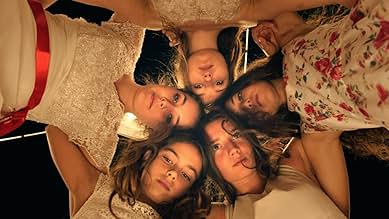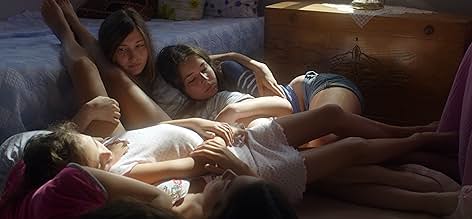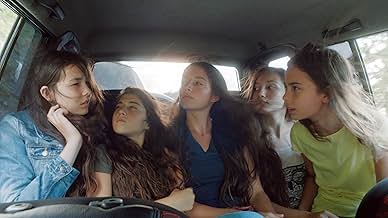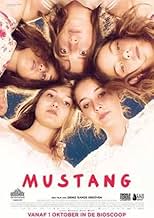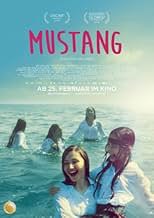VALUTAZIONE IMDb
7,6/10
42.135
LA TUA VALUTAZIONE
Quando cinque ragazze orfane giocano innocentemente con dei ragazzi su una spiaggia, i loro tutori conservatori scandalizzati li rinchiudono mentre vengono organizzati matrimoni forzati.Quando cinque ragazze orfane giocano innocentemente con dei ragazzi su una spiaggia, i loro tutori conservatori scandalizzati li rinchiudono mentre vengono organizzati matrimoni forzati.Quando cinque ragazze orfane giocano innocentemente con dei ragazzi su una spiaggia, i loro tutori conservatori scandalizzati li rinchiudono mentre vengono organizzati matrimoni forzati.
- Regia
- Sceneggiatura
- Star
- Candidato a 1 Oscar
- 46 vittorie e 63 candidature totali
Günes Sensoy
- Lale
- (as Günes Nezihe Sensoy)
Nihal G. Koldas
- The Grandmother
- (as Nihal Koldas)
Recensioni in evidenza
A film like this can work on many levels, and surely not just on a basic entertainment factor. It's intriguing because it sets up situations and dilemmas that different sections of the world may entirely reveal shock at it, but these sort of situations can be unfortunate for all involved. Gender issues are at the forefront here and the writing cleverly touches on the issue, along with sexuality as a whole, while creating well-developed characters that serve to guide us through the fascinating, intriguing tale. The entire film is well-directed, a lot of nuance in the proceedings as well as a delicate hand that may have spiraled out of control in the hands of another director. The acting is also uniformly good, and all of the young female characters (in particular the lead) handle the heavy material really well.
Greetings again from the darkness. Writer/director Deniz Gamze Erguven admits to being inspired by Sophia Coppola's 1999 The Virgin Suicides (though this is not a remake), and by offering us a rare glimpse into the lives of five sisters in a rural community in Turkey, it's clear why the film has been so well received at film festivals – culminating in an Oscar nomination for Best Foreign Film. It's a bit confusing that the film is credited to France (Ms. Erguven's current place of residence) as it takes place in Turkey and is performed in Turkish. But of course, country of origin is a minor ripple in this year's uproar over diversity at the Oscars.
Not being any type of expert in Turkey culture or customs, I must accept that the insights provided by Ms. Erguven and her co-writer Alice Winocour are somewhat accurate, which makes the balance between the tradition of female oppression and the amazing spirit of the girls so relatable for many. What begins as a seemingly harmless game of chicken the girls play with some classmates (boys) on the way home after the semester's last day of classes, turns into a series of events that most will find absolutely unacceptable. The shame brought to the family and the threat of the girls being "spoiled" highlights the extreme reactions from their grandmother (Nihal G Koldas) and Uncle Erol (Ayberk Pekcan).
Lale (Gunes Sensoy) is the youngest of the sisters and in the end proves to be the toughest and most independent. And that's really saying something. We take in much of what happens through Lale's expressive eyes, and we as viewers long for reasonableness to enter their lives. After being what can only be described as imprisoned in their own home, the spirit of the girls collectively and individually becomes clear. They find ways, small and large, to rebel but it's soon enough clear that the mission is to marry the girls off before it's too late (there's that "spoiled" thing again).
As Lale witnesses what her older sisters are subjected to, and how happiness or their own wishes play no role, she becomes more determined to avoid such destiny. With skewed perspective, one might make the argument that Grandmother and Uncle are doing what they think is in the long term best interests of the girls, but the Uncle's despicable actions void any such thought. Instead we are left to marvel at the strength and spirit of the girls in world that holds them in such low regard as individuals.
Lale's sisters are Sonay (IIayda Akdogan), Nur (Doga Zeynep Doguslu), Selma (Tugba Sunguroglu) and Ece (Elit Iscan). The girls are so natural together that we never doubt their sisterly bond. They argue like sisters, defend each other as sisters, and play together like sisters were it not for their isolated existence, their bond would be a joy to behold. The cinematography throughout the film adds to the discomfort and dread we feel, and the acting is naturalistic and believable. In the end, it's the unbridled freedom of the titular creature that Lale defiantly embraces whatever the consequences may be.
Not being any type of expert in Turkey culture or customs, I must accept that the insights provided by Ms. Erguven and her co-writer Alice Winocour are somewhat accurate, which makes the balance between the tradition of female oppression and the amazing spirit of the girls so relatable for many. What begins as a seemingly harmless game of chicken the girls play with some classmates (boys) on the way home after the semester's last day of classes, turns into a series of events that most will find absolutely unacceptable. The shame brought to the family and the threat of the girls being "spoiled" highlights the extreme reactions from their grandmother (Nihal G Koldas) and Uncle Erol (Ayberk Pekcan).
Lale (Gunes Sensoy) is the youngest of the sisters and in the end proves to be the toughest and most independent. And that's really saying something. We take in much of what happens through Lale's expressive eyes, and we as viewers long for reasonableness to enter their lives. After being what can only be described as imprisoned in their own home, the spirit of the girls collectively and individually becomes clear. They find ways, small and large, to rebel but it's soon enough clear that the mission is to marry the girls off before it's too late (there's that "spoiled" thing again).
As Lale witnesses what her older sisters are subjected to, and how happiness or their own wishes play no role, she becomes more determined to avoid such destiny. With skewed perspective, one might make the argument that Grandmother and Uncle are doing what they think is in the long term best interests of the girls, but the Uncle's despicable actions void any such thought. Instead we are left to marvel at the strength and spirit of the girls in world that holds them in such low regard as individuals.
Lale's sisters are Sonay (IIayda Akdogan), Nur (Doga Zeynep Doguslu), Selma (Tugba Sunguroglu) and Ece (Elit Iscan). The girls are so natural together that we never doubt their sisterly bond. They argue like sisters, defend each other as sisters, and play together like sisters were it not for their isolated existence, their bond would be a joy to behold. The cinematography throughout the film adds to the discomfort and dread we feel, and the acting is naturalistic and believable. In the end, it's the unbridled freedom of the titular creature that Lale defiantly embraces whatever the consequences may be.
Mustang tackles with Turkey's most important problem, the issue of woman in society: her secondary place and the patriarchal chains around her, due to culture, politics, religion and socio-economic development. Therefore, the director's effort should be viewed as most welcome and needed attempt. I think the director manages to show the virtual prison experienced by all sort of women in our society, through the case of those sisters.
However, and despite the director's best intention, movie in general fails to deliver an authentic picture of everyday life and details in the country. Oppression of girls and their youthful desires is correctly depicted as a whole, but done in somewhat unrealistic ways. You get the feeling that the director, the script writer, and even the actors remain quite "foreigners" to the situations they are interested. Some are accusing the director as orientalist (playing to Western gaze) because of these failings. I don't agree, but it would be better if they had worked more on the everyday life and details of the countryside where the film occurs (like better local dialogue, better acquaintance of local customs).
In short, I found Mustang a very important movie, but with its own problems. Technically it does not offer something novel, but it is courageous directly to point the gender issue in a very conservative society.
However, and despite the director's best intention, movie in general fails to deliver an authentic picture of everyday life and details in the country. Oppression of girls and their youthful desires is correctly depicted as a whole, but done in somewhat unrealistic ways. You get the feeling that the director, the script writer, and even the actors remain quite "foreigners" to the situations they are interested. Some are accusing the director as orientalist (playing to Western gaze) because of these failings. I don't agree, but it would be better if they had worked more on the everyday life and details of the countryside where the film occurs (like better local dialogue, better acquaintance of local customs).
In short, I found Mustang a very important movie, but with its own problems. Technically it does not offer something novel, but it is courageous directly to point the gender issue in a very conservative society.
According to Wikipedia, "The English word mustang is derived from the Spanish word mestengo (variant of mesteño), defined as 'wild, stray, ownerless'." The image and idea of a wild, ownerless horse has inspired imaginations throughout the western world and led to the word mustang representing sports cars, airplanes, ships, cities, sports teams and even used by artists, musicians, businesses and by some politicians who consider themselves rogue agents of change. 2015 added to the word's long list of uses the French-Turkish drama "Mustang" (PG-13, 1:37), which became France's submission for the 88th Annual Academy Awards and was nominated for (and was a strong contender for) the Best Foreign Language Film Oscar. Given its subject matter and quality, "Mustang" is a great name for a great film.
The movie explores the relationships and lives of five adolescent sisters living in the seaside village of Inebolu in north-central Turkey. Inebolu is known for, among other things, the spirited (and successful) defense it mounted when attacked during the Turkish War for Independence. Fittingly, these five girls (played by Güneş Şensoy, Doğa Doğuşlu, Elit İşcan, Tuğba Sunguroğlu and İlayda Akdoğan) are also very spirited. You might even call them wild (in a strongly independent sense), they are kind of ownerless – as orphans living with their grandmother (Nihal Koldaş) and uncle (Ayberk Pekcan) – and they are quite prone to stray from the strict expectations of their strongly conservative society – as much as they can.
When the girls are caught innocently frolicking in the sea with some of their (gasp) male classmates one day after school, their lives change suddenly and dramatically. After much yelling and some beatings from their caregivers, the girls are confined to the house and lose almost all contact with the outside world, except for the people that their uncle and grandmother bring to the house. Telephones and computers are locked in a closet, bars are placed over the windows, clothing the girls chose for themselves are replaced by drab, formless dresses and daily life becomes an endless series of home economics classes in which female relatives come by to teach the girls how to be proper Turkish wives.
Also coming by the house is a parade of single young men with whom grandma begins arranging marriages for the girls. She's starting with the oldest and plans on working her way down the line. The girls, however, have other ideas. Without revealing too much about the rest of the movie, I'll just say that what grandma intends to be a succession of five cookie-cutter weddings doesn't work out exactly the way she and the girls' uncle plan. In spite of instances of abuse and the increasingly severe limitations on their personal freedom, the girls still fight to be themselves, spread their wings, meet boys on their own, keep supporting each other and enjoy each other's company as long as possible.
"Mustang" represents the best in foreign film. Besides co-writing the script, this is French-Turkish filmmaker Deniz Gamze Ergüven's directorial debut and she gives us a film which displays consistently expert tone and pacing. Some of the plot points feel overly dramatic, but this story takes an important look at extremely conservative southwestern Asia societies. Most westerners won't be able to readily relate to the lives of these girls, but the interesting story and very natural performances draw in the audience for an entertaining experience while helping them understand the world in which they live. "Mustang" is also largely a celebration of sisterhood and feminine empowerment, but it's hard to imagine anyone not being touched by this very personal and dramatic story. "A-"
The movie explores the relationships and lives of five adolescent sisters living in the seaside village of Inebolu in north-central Turkey. Inebolu is known for, among other things, the spirited (and successful) defense it mounted when attacked during the Turkish War for Independence. Fittingly, these five girls (played by Güneş Şensoy, Doğa Doğuşlu, Elit İşcan, Tuğba Sunguroğlu and İlayda Akdoğan) are also very spirited. You might even call them wild (in a strongly independent sense), they are kind of ownerless – as orphans living with their grandmother (Nihal Koldaş) and uncle (Ayberk Pekcan) – and they are quite prone to stray from the strict expectations of their strongly conservative society – as much as they can.
When the girls are caught innocently frolicking in the sea with some of their (gasp) male classmates one day after school, their lives change suddenly and dramatically. After much yelling and some beatings from their caregivers, the girls are confined to the house and lose almost all contact with the outside world, except for the people that their uncle and grandmother bring to the house. Telephones and computers are locked in a closet, bars are placed over the windows, clothing the girls chose for themselves are replaced by drab, formless dresses and daily life becomes an endless series of home economics classes in which female relatives come by to teach the girls how to be proper Turkish wives.
Also coming by the house is a parade of single young men with whom grandma begins arranging marriages for the girls. She's starting with the oldest and plans on working her way down the line. The girls, however, have other ideas. Without revealing too much about the rest of the movie, I'll just say that what grandma intends to be a succession of five cookie-cutter weddings doesn't work out exactly the way she and the girls' uncle plan. In spite of instances of abuse and the increasingly severe limitations on their personal freedom, the girls still fight to be themselves, spread their wings, meet boys on their own, keep supporting each other and enjoy each other's company as long as possible.
"Mustang" represents the best in foreign film. Besides co-writing the script, this is French-Turkish filmmaker Deniz Gamze Ergüven's directorial debut and she gives us a film which displays consistently expert tone and pacing. Some of the plot points feel overly dramatic, but this story takes an important look at extremely conservative southwestern Asia societies. Most westerners won't be able to readily relate to the lives of these girls, but the interesting story and very natural performances draw in the audience for an entertaining experience while helping them understand the world in which they live. "Mustang" is also largely a celebration of sisterhood and feminine empowerment, but it's hard to imagine anyone not being touched by this very personal and dramatic story. "A-"
10R-Clercx
I just saw this movie in a nearly full capacity packed 300 seat theater. Very rarely I rate 10 out of 10, but this piece of film art blew me away from beginning to end, so what more can a viewer expect out of cinema.
Five teenagers grow up in a very conservative Turkish village. From early age it is expected that they will marry with a boy the elders prefer, rather than loose themselves in foolish romance. What makes the movie so appealing is the outstanding acting performances of the five teenagers and the realistic way the plot develops. Mustang at the same time offers a laugh and a tear; the viewer is offered the perspective of young ladies growing up, discovering their sexuality and being told that this is a bad thing.
Of course some critics will argue that this movie might give viewers a wrong impression about Turkey. This kind of criticism would be the same as stating when a director portrays a story about any kind of bad situation in a certain country, a viewer might get a wrong impression about the country as a whole. This way not one movie should be set in any country in the world because some viewers will always generalize a specific situation.
This movie is clearly set in a small rather isolated agricultural village in Turkey; it clearly isn't set in Istanbul (the more modern capital of Turkey). The director also does a very good job of not pointing the finger towards Islam (the main religion in Turkey).
What is questioned in this movie is not so much about religion, it is conservatism as a concept which is questioned.
A must see movie, one of the best if not the best I've seen in 2015 and the only one I saw in 2015 I rate 10/10.
Five teenagers grow up in a very conservative Turkish village. From early age it is expected that they will marry with a boy the elders prefer, rather than loose themselves in foolish romance. What makes the movie so appealing is the outstanding acting performances of the five teenagers and the realistic way the plot develops. Mustang at the same time offers a laugh and a tear; the viewer is offered the perspective of young ladies growing up, discovering their sexuality and being told that this is a bad thing.
Of course some critics will argue that this movie might give viewers a wrong impression about Turkey. This kind of criticism would be the same as stating when a director portrays a story about any kind of bad situation in a certain country, a viewer might get a wrong impression about the country as a whole. This way not one movie should be set in any country in the world because some viewers will always generalize a specific situation.
This movie is clearly set in a small rather isolated agricultural village in Turkey; it clearly isn't set in Istanbul (the more modern capital of Turkey). The director also does a very good job of not pointing the finger towards Islam (the main religion in Turkey).
What is questioned in this movie is not so much about religion, it is conservatism as a concept which is questioned.
A must see movie, one of the best if not the best I've seen in 2015 and the only one I saw in 2015 I rate 10/10.
Lo sapevi?
- QuizThe football scene was acted at an actual match where no males above the age of 12 were allowed to attend. Since the filmmakers were denied filming the match at the last minute, they sent the actresses to perform the scene anyway and used actual footage from the broadcast in the film.
- BlooperThe girls want to go to the Galatasaray-Trabzon match. They say to Yasin that they need to go to Trabzon. However, later when we see them on TV, the score shows Galatasaray's (GS) name first which means the match is in Istanbul not in Trabzon.
- ConnessioniFeatured in 73rd Golden Globe Awards (2016)
- Colonne sonoreHome
Written by Nick Cave / Warren Ellis
Performed by Nick Cave & Warren Ellis
Publishing 2929 Tunes / BMG Sapphire Songs
(p) 2009 2929 Productions LLC
Courtesy of BMG Rights Management (France)
I più visti
Accedi per valutare e creare un elenco di titoli salvati per ottenere consigli personalizzati
- How long is Mustang?Powered by Alexa
Dettagli
- Data di uscita
- Paesi di origine
- Siti ufficiali
- Lingua
- Celebre anche come
- Mustang: Belleza salvaje
- Luoghi delle riprese
- Inebolu, Kastamonu, Turchia(girls' town)
- Aziende produttrici
- Vedi altri crediti dell’azienda su IMDbPro
Botteghino
- Budget
- 1.300.000 € (previsto)
- Lordo Stati Uniti e Canada
- 845.464 USD
- Fine settimana di apertura Stati Uniti e Canada
- 20.321 USD
- 22 nov 2015
- Lordo in tutto il mondo
- 5.274.664 USD
- Tempo di esecuzione1 ora 37 minuti
- Colore
- Proporzioni
- 2.35 : 1
Contribuisci a questa pagina
Suggerisci una modifica o aggiungi i contenuti mancanti



